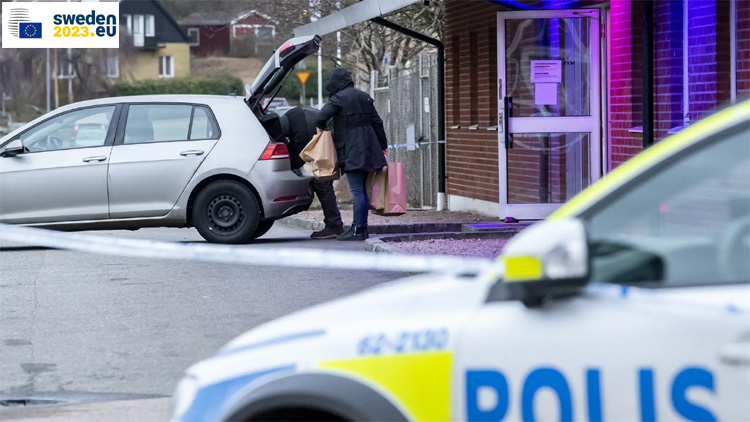More effective forms of cooperation and stricter EU regulations. During the Swedish Presidency of the Council of the EU, the Member States agreed on a whole host of measures to better fight organised crime.
During the Swedish Presidency, EU cooperation on combating organised crime was further enhanced. There will be more effective means of accessing proceeds of crime that have crossed national borders. It will also be significantly easier to request digital evidence from companies such as Google and Instagram.
Easier to confiscate criminal assets
Because organised crime largely takes place across national borders, it is important to have effective means of accessing criminal proceeds, regardless of how they are moved within the EU. The Member States have therefore agreed on new legislation that will make it easier to track and identify proceeds of crime. This will also provide greater leeway to confiscate criminal proceeds, which will be able to take place in some cases without the need for a criminal judgment. The Member States will now negotiate these matters with the European Parliament.
Law enforcement authorities’ access to bank account details
Almost all serious organised crime aims to generate money. Ultimately, the police must be able to quickly identify the bank accounts of criminals in order to confiscate their criminal proceeds. Earlier this year, the Member States agreed to give law enforcement authorities access to bank account details throughout the EU. Police investigation times are expected to decrease, which will increase the likelihood of confiscating criminal proceeds.
Strengthened role of the EU Drugs Agency
Trilogue negotiations on a regulation to expand and strengthen the role of the EU Drugs Agency were initiated and concluded during the Swedish Presidency. As a result, the Agency will be able to respond more effectively to new health and safety challenges posed by illegal narcotics. This will be possible through measures such as increased support to the Member States, increased knowledge about the negative consequences of narcotics and increased international cooperation. The regulation will be adopted by the Council on 27 June 2023 and the new legislation will enter into force in mid-2024.
More effective cross-border exchange of information
Effective exchange of information between law enforcement authorities in different Member States is key to fighting cross-border crime. The Member States have therefore adopted a new directive aimed at facilitating this type of information exchange. The directive sets out common rules for how information is to be requested and a uniform case management system.
Easier to gather digital evidence
Offences are increasingly planned or carried out online, making authorities all the more dependent on electronic evidence to track and punish criminals. However, it often takes too long for authorities to get hold of this evidence, especially if the information is stored outside the EU.
The EU has therefore adopted a new legislation package that will make it significantly easier for prosecutors to access the evidence they need. The new legislation will allow prosecutors to directly contact service providers to demand information that can be used as evidence. This includes US companies such as Google, Instagram and Microsoft.
The Member States and the European Parliament agreed on the package in January this year, which means the new legislation will soon enter into force in all Member States.
Cooperation platform for joint investigation teams
Under the Swedish Presidency, the Member States also decided to adopt a new cooperation platform. This platform will be used for secure electronic exchange of operational data, such as information and evidence, within joint investigation teams. A joint investigation team can be established by law enforcement and judicial authorities from two or more Member States to coordinate and jointly take measures in international criminal investigations. The platform will provide various tools for secure electronic communications, such as chat tools, and audio and video conference capability.
‘Going dark’: establishment of a high-level expert group
The Swedish Presidency has also proposed and pushed for creation of a high-level group consisting of relevant actors from various fields such as law enforcement, human rights, infrastructure and competitiveness. The high-level group, which is now in place, will draw on the support of expert groups in its work addressing operational challenges to law enforcement as regards access to digital information – especially encryption and data storage.
Stricter rules to combat human trafficking
Every year, there are more than 7 000 victims of human trafficking in the EU. The forms of human trafficking have evolved over time, thus necessitating an update of existing EU legislation against human trafficking. On 9 June, the Member States agreed to make it an offence to knowingly use services provided by victims of human trafficking. They have also specified that the offence of human trafficking can take place for the purpose of forced marriage and illegal adoption. The Member States will now negotiate the matter with the European Parliament.
More effective means to combat violence against women
On 9 June, the Member States also agreed on a new directive to combat violence against women and intimate partner violence. This will ensure a minimum level of protection throughout the EU. Among other things, the new legislation will criminalise female genital mutilation, online stalking and online harassment. It also includes rules on support and protection for victims of crime, access to justice, preventive measures and coordination and cooperation between public authorities. The Member States will now negotiate the matter with the European Parliament.
How violations of EU sanctions will be punished
Since Russia’s invasion of Ukraine, the EU has imposed a long series of sanctions. The European Commission has evaluated how the Member States regulate violations of those sanctions and found that their measures vary dramatically. The Commission has therefore proposed a new directive aimed at enhancing compliance with EU sanctions, particularly against Russia. The directive establishes a minimum threshold for how the Member States punish people and businesses that violate EU sanctions. On 9 June, the Member States agreed on the proposal and will now negotiate the matter with the European Parliament.

